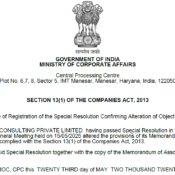LLP Filings in Bangalore
After your LLP gets registered, you must file your LLP’s Income tax return, Roc return, and your Director-ship KYC regularly with Roc, Income-tax.
Various returns are there for LLP filing.
These have been bifurcated as Income-tax and Mca.
LLP Roc filing
Your registered LLP has been registered under LLP Act 2008. and the LLP has been regulated by the Ministry of corporate affairs (MCA); you shall file annual returns and financials with MCA every year.
Below are the Roc filings:
Table of Contents
ToggleForm 8 Financial statements
Form 8 is the accounts statement, and You shall file the solvency report every year on or before 30th October.
The revised-late fee for non-filing Mca form 8 is Rs.10 per day for small LLPs and Rs.20 per day for other LLPs.
Form 11 Annual return
Form 11 is an annual return that you must file irrespective of your business turnover. Its due date for filing with Mca is 30th May of every year.
The revised-late fee for non-filing Mca form 11 is Rs.10 per day for small LLPs and Rs.20 per day for other LLPs.
LLP Partners KYC filings
Each designated Partner must have the Directorship number (DPIN). The DPIN holder must file their KYC each year with McA.
The due date for filing partner KYC is on or before 30th September. The late fee for Partner KYC is Rs.5000 per DPIN.
LLP filing income tax return
The Income tax department has made the rules for tax filing a must for all LLPs in India.
Your LLP shall file its income return in the form of ITR-5 every year on or before 30th September,
Today, LLP filing tax on its net profit is at 30%, after adjusting partners’ Salary, interest expenses, etc.
Your LLP filing tax return or ITR must be filed irrespective of your profit or Loss.
LLP Audit
In your LLP business, if the turnover crosses Rs.40 Lac a year or your LLP partner capital exceeds Rs.25 Lac a year, you must get your LLP audited by a statutory auditor.
If your business is below the above Limit, then no Audit applies. You can certify your books of accounts for filing with Roc and income tax.
Changes in the LLP rules
As per changes in the LLP filing rules, only the working Partner of the LLP can get a salary from your LLP firm.
Also, You must record any interest payments or pay to the Partner’s capital account in the LLP agreement.
LLP Act has registered your LLP, and your LLP has been controlled by the Ministry of corporate affairs (MCA); you shall file with every-year annual return and financials.
The Limit on the LLP’s partner salary is the same as per Partnership Act, the slab given below:
On the first Rs.3 Lac of your business profit, you can pay a maximum of Rs.1.5 Lac salary or 90%, whichever is higher.
On balance, you can make 60% as a salary to partners.
For example, if your LLP business net profit is only Rs.1 Lac or your LLP is under Loss, then you can make your Partner’s Salary only Rs.1.5 Lac.
LLP partner’s salary payment comes under TDS section 92B only.
LLP partners can get Salary, interest on their capital investment up to 12%, and profit share from LLP.
LLP Filings
LLPs in India are governed by the Limited Liability Partnership Act, 2008 and the Limited Liability Partnership Rules, 2009.
Form 8 (Statement of Account and Solvency):
This form needs to be filed annually and contains information about the financial position of the LLP.
Form 11 (Annual Return):
This form needs to be filed annually and contains information about the LLP’s members, partners, and financial transactions.
Form 3 (Change in LLP Agreement):
This form needs to be filed whenever there are any changes to the LLP Agreement.
Form 4 (Change in Partners or Designated Partners):
This form needs to be filed whenever there are any changes in the partners or designated partners of the LLP.
CS Role in the LLP
In an LLP, the role of a Company Secretary (CS) is to ensure compliance with various laws and regulations that apply to the LLP. This includes the Limited Liability Partnership Act, 2008 and the Limited Liability Partnership Rules, 2009, as well as other relevant laws and regulations.
The CS is responsible for ensuring that the LLP files all required forms and documents with the Ministry of Corporate Affairs (MCA) on a timely basis. This includes forms such as the annual return (Form 11) and the statement of account and solvency (Form 8), as well as any other forms that may be required in specific circumstances.
The CS is also responsible for maintaining proper records and documents for the LLP, including the LLP Agreement, minutes of meetings, and financial records. They may also be responsible for preparing and filing any necessary documents in case of any changes to the LLP, such as changes in partners or designated partners.
Ensure compliance with laws and regulations:
By ensuring that the LLP is compliant with all relevant laws and regulations, you can help to reduce the risk of legal issues and fines, which can have a negative impact on the LLP’s business.
Maintain accurate records:
By maintaining accurate and up-to-date records, you can help to improve the transparency and efficiency of the LLP’s operations. This can help to ensure that the LLP is well-managed and that decisions are based on accurate and complete information.
Provide expert guidance:
As a CS, you have a thorough understanding of the laws and regulations that apply to LLPs. You can use this expertise to provide guidance to the LLP’s management on various matters, such as how to comply with legal requirements and how to manage the LLP’s finances.
Assist with decision-making:
By providing accurate and timely information, you can help the LLP’s management to make informed decisions that are in the best interests of the LLP. This can help to improve the LLP’s overall performance and success.
Overall, our CS can play a valuable role in helping an LLP to improve its business by providing expert guidance, ensuring compliance with laws and regulations, and assisting with decision-making.
Important Links –
Like Us On Facebook

Our Client's Review
EXCELLENTTrustindex verifies that the original source of the review is Google. Best place to file ur GST n IT returns .. They respond quickly, communicate well and get ur work done as per ur needs in a very short time ..Posted onTrustindex verifies that the original source of the review is Google. Best place for Income tax filingPosted onTrustindex verifies that the original source of the review is Google. Of all the CA, CS teams I have interacted with, they are the most prompt and organized. I have taken their services for almost 3 years now for various things like income tax queries, income tax filing, networth certificates, and compliance certificates. They always display a clear understanding of the law and are also able to explain it to you in layman terms. Overall a very resourceful and courteous team. Thank you for the support!Posted onTrustindex verifies that the original source of the review is Google. Best company secretary I bangalore ever seen such quick quality servicePosted onTrustindex verifies that the original source of the review is Google. Prakasha & Co has been a lifesaver for me when it comes to my tax dispute and filings with IT office. They are always very responsive and helpful whenever I have any questions or issues, I recently had an issue with my sister business GST filings, and they were able to quickly identify the issue and help me resolve it. They really go above and beyond to make sure their clients are taken care of.Posted onTrustindex verifies that the original source of the review is Google. ''The team at Prakasha& Co made sure my company was compliant with all the legal requirements. Their attention to detail and timely response was truly remarkable."Posted onTrustindex verifies that the original source of the review is Google. "I was impressed with the level of customer service provided by Prakasha& Co. They were always available to answer my questions and provide guidance throughout the company registration process."
Important Links
- Top 10 GST Registration Consultants in Bangalore
- Top 10 Best Income Tax Lawyers in Bangalore
- Top 10 Trademark Registration Consultants in Bangalore
- GST Registration in Bangalore
- Private Limited Company Registration in Bangalore
- Partnership Firm Registration in Bangalore
- Proprietorship Registration in Bangalore
- Trademark Registration in Bangalore
- Audit Frim in Bangalore
- CA Firm in Bangalore
- Accounting Services in Bangalore
- GST Lawyers in Bangalore
- Payroll Services Provider in Bangalore
- Payroll Consultant in Bangalore
- Income Tax Lawyer in Bangalore
All Categories
- Audit
- Blogs
- Bookkeeping Services
- Company Registration
- Company secretary Legal & Chartered Accountant
- Digital Signature Certificate (DSC) Services
- FSSAI Registration and Consultation
- GST
- Income tax
- Partnership Firm Registration
- Payroll Services
- Risk Management Services
- Startup Registration Process
- Trademark Registration
- Uncategorized








